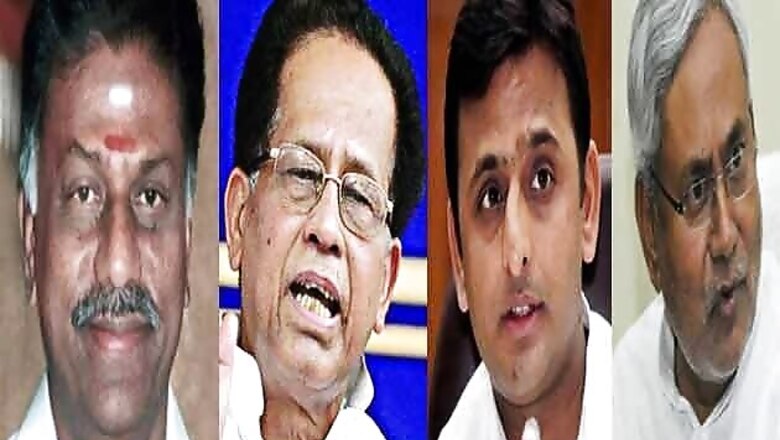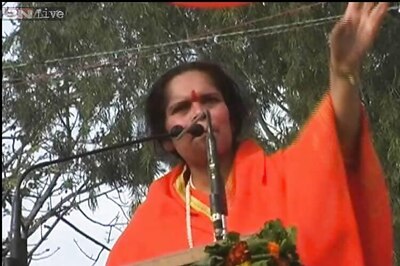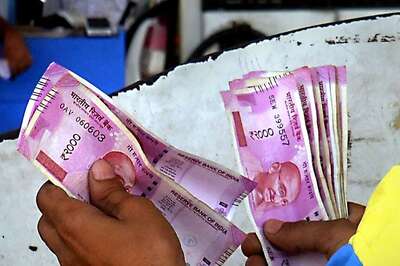
views
New Delhi: While the Narendra Modi government may be gloating over the 14th Finance Commission's recommendation increasing the share of states in Central taxes to 42 per cent from the current 32 per cent, but the share of nine states has decreased.
Andhra Pradesh (including Telangana), Assam, Bihar, Himachal Pradesh, Odisha, Rajasthan, Tamil Nadu, Uttar Pradesh and Uttarakhand in fact stand to lose in the Commission's recommendations.
Non-BJP-ruled states like Telangana, Assam, Himachal Pradesh, Odisha, Tamil Nadu and Uttarakhand, or Bihar, which is going to polls later in 2015, will protest the decrease in their share and try to derive political mileage out of it.
The Commission added a new criterion of forest cover for devolution of Central taxes which has gone against the nine states. "We believe that a large forest cover provides huge ecological benefits, but there is also an opportunity cost in terms of area not available for other economic activities and this also serves as an importantindicator of fiscal disability," according to the Commission.
The panel has assigned 7.5 per cent weight to forest cover for inter-se determination of the shares of taxes to the states, while population carries 17.5 per cent weight, demographic change 10, income distance 50 and area 15 per cent weight.
With the addition of the new criterion, Uttar Pradesh is the biggest loser followed by Bihar. Uttar Pradesh's per-se share has reduced from 19.677 per cent in 13th Finance Commission to 17.959 per cent now, while Bihar's has come down from 10.917 per cent to 9.665 per cent.
Janata Dal (United) spokesperson and Rajya Sabha member KC Tyagi expressed dismay over reduction of share to the nine states. Talking to IBNLive he said, "This is very dangerous. It means the government was lying that all the share of all the states has increased."
Tyagi, whose party along with its allies will fight it out against the BJP-led NDA in Bihar elections, said he did not know about it and will give a detail reaction after verifying the facts.
During his last stint as Bihar Chief Minister, Nitish Kumar had repeatedly demanded Congress-led UPA government at the Centre to accord special status to the status and grant special aid to it. Now, far from getting a special status, Bihar's share has reduced. This is sure to raise the hackles of the JDU.
Meanwhile, 19 states stand to gain from the new arrangement. Arunachal Pradesh is the biggest gainer, followed by Chhattisgarh. Among the other major gainers are Maharashtra, Madhya Pradesh, Karnataka, Jharkhand and Jammu and Kashmir. Incidentally, except for Arunachal Pradesh and Karnataka, BJP has a say in the rule of the other five states.
As per the increased devolution suggested in the report of the 14th Finance Commission, the states will get Rs 3.48 lakh crore in 2014-15 and Rs 5.26 lakh crore in 2015-16. "The higher tax devolution will allow states greater autonomy in financing and designing of schemes as per their needs and requirements," the report said.
Accepting recommendations of the 14th Finance Commission, Prime Minister Modi wrote to all state governments saying the Centre has decided to devolve maximum money to states and allow them the required freedom to plan the course of states' development. Addressing the chief ministers, the Prime Minister said his government has been working to strengthen India's federal polity and promote cooperative federalism.
Appealing to the states, he said that strong states are the foundation of a strong India and progress of the country depends on the progress of states. The Centre is committed to the idea of empowering states in all possible ways, he said.
"We also believe that states should be allowed to chalk out their programmes and schemes with greater financial strength and autonomy, while observing financial prudence and discipline," said Modi.
"We are clear that without this, local development needs cannot be met and marginalised communities and backward regions cannot be brought into the mainstream," he added.
While Abhijit Sen, part-time member of the Commission headed by YV Reddy, gave a dissenting note, the government accepted the majority decision on tax devolution to the states. Sen, in his note, favoured devolution of 38 per cent of the divisible pool in the first year. After assessing the revenue and expenditure of the states for the period 2015-20, the Commission has recommended a grant of Rs 1.94 crore to meet the deficit of 11 states.
"The consequence of this much greater devolution to the states is that the fiscal space for the centre will reduce in the same proportion," the report said, adding that the dominant view was that the majority of the resources should flow in the form of tax devolution.
An overwhelming majority of states have suggested reducing the number of Centrally sponsored schemes as well as outlays on them, the Finance Commission report said. Keeping in the mind the spirit of cooperative federalism that has underpinned the creation of NITI Aayog the government has accepted the recommendation of FFC to keep the states share of Union Tax proceed (net) at 42 per cent, official sources said. Observing that states will see a quantum jump in transfers, sources said, this is the largest ever change in the percentage of devolution.
In the past, when Finance Commissions have recommended an increase, it has been in the range of 1-2 per cent. "As compared to the total devolutions in 2014-15, the total devolutions of the states in 2015-16 will increase by over 45 per cent." The Commission has recommended distribution of grants to states for strengthening duly elected gram panchayats and municipal bodies. These grants will be divided into basic grants and performance grants.
The total grant to the local bodies including panchayats and local bodies for the five-year period ending March 31, 2020 works out to Rs 2.88 lakh crore. The government, sources said, has also accepted the recommendations of the Commission with regard to devolution of higher resources to the local bodies. With regard to the centrally sponsored schemes (CCS), it has identified 30 schemes for transfer to the states after taking into account higher devolution.
However, sources said that in view of the importance of the schemes and legal obligations, only 8 CCS would be delinked from support from the centre.
As for the other suggestions of the Commission with regard to promoting cooperative federalism, implementation of the Goods and Services Tax (GST), fiscal consolidation, pricing of public utilities and public sector enterprises, sources said they would be examined by the government in due course.
Charts:
Inter-se Share of States (per cent) 13th Finance Commission
Andhra Pradesh 6.937
Arunachal Pradesh 0.328
Assam 3.628
Bihar 10.917
Chhattisgarh 2.470
Goa 0.266
Gujarat 3.041
Haryana 1.048
Himachal Pradesh 0.781
Jammu & Kashmir 1.551
Jharkhand 2.802
Karnataka 4.328
Kerala 2.341
Madhya Pradesh 7.120
Maharashtra 5.199
Manipur 0.451
Meghalaya 0.408
Mizoram 0.269
Nagaland 0.314
Orissa 4.779
Punjab 1.389
Rajasthan 5.853
Sikkim 0.239
Tamil Nadu 4.969
Tripura 0.511
Uttar Pradesh 19.677
Uttarakhand 1.120
West Bengal 7.264
All States 100.000
Inter-se Share of States (per cent) 14th Finance Commission:
Andhra Pradesh 4.305
Arunachal Pradesh 1.370
Assam 3.311
Bihar 9.665
Chhattisgarh 3.080
Goa 0.378
Gujarat 3.084
Haryana 1.084
Himachal Pradesh 0.713
Jammu & Kashmir 1.854
Jharkhand 3.139
Karnataka 4.713
Kerala 2.500
Madhya Pradesh 7.548
Maharashtra 5.521
Manipur 0.617
Meghalaya 0.642
Mizoram 0.460
Nagaland 0.498
Odisha 4.642
Punjab 1.577
Rajasthan 5.495
Sikkim 0.367
Tamil Nadu 4.023
Telangana 2.437
Tripura 0.642
Uttar Pradesh 17.959
Uttarakhand 1.052
West Bengal 7.324
All States 100.000



















Comments
0 comment